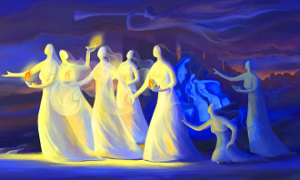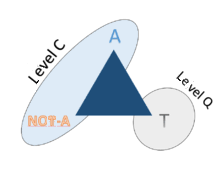
Posts Tagged ‘God’
The society that comes
This is the title of the last chapter of Chul Han’s book “Vita contemplativa”, in which he analyzes the religious crisis and its consequences for culture, being and current society.
“Vita contemplativa”, in which he analyzes the religious crisis and its consequences for culture, being and current society.
It begins by stating: “the current crisis of religion cannot be reduced simply to the fact that we have lost faith in God or become suspicious of certain dogmas” (page 153), it resides in the fact that we have lost the capacity to contemplate, a growing coercion Both communication and production make “contemplative time” difficult, there is no way to “stop”.
He quotes Malebrance who said that attention is like a “natural prayer of the soul”, our hyperactivity can be blamed on religion, “the crisis of religion is a crisis of attention” (page 154), and the worst thing is that the author does not points out, fanaticism dominates “attention”.
The author says “listening is the verb for religion” (page 155), but it is also for meditation, study, contemplation and reflection, whatever the threshold principle of a thought, it requires a stop, an inactivity.
In the current thought of romanticism, “freedom is decoupled from the self”, action gives way to listening: “only the tendency to intuition, when directed towards infinity, puts unlimited freedom in mind” (page 159) says the author now quoting Schleiermacher.
Still quoting Schleiermacher, he writes that tears interrupt the “spell that the subject places on nature” (page 160), dissolved in tears, the subject surrenders to the Earth.
Now quoting Agamben in “The Coming Community” he states about the coming kingdom of the Messiah that Walter Benjamin would have told Ernest Block and is quoting in Han:
“a rabbi, a true Kabbalist, once said: to establish the kingdom of peace, it is not necessary to destroy everything and start a completely new world; it would be enough to move that cup or that bush or that stone a little bit, and all things in the same way. But this little bit is so difficult to achieve and its measure so difficult to find that, as far as the world is concerned, men cannot achieve it and the messiah must arrive” (Aganbem apud Han, 2023, pg. 171).
It is this arrival, called parousia (a new coming for Christians) that is also celebrated at Christmas.
HAN, B.C. (2023). Vita Contemplativa: In Praise of Inactivity, transl. Daniel Steuer, USA, ed. Polity.
The Parable of the Wise Virgins
The parable is a parable, therefore it should not be taken literally, it may seem to refer to sexuality, the fact that 5 virgins have oil for the whole night and another 5 do not have enough oil, indicates that we must prepare well when the “ bridegroom” arrives, in the biblical case it is the encounter with God, and the oil means the “habit” that we develop in life to get there.
should not be taken literally, it may seem to refer to sexuality, the fact that 5 virgins have oil for the whole night and another 5 do not have enough oil, indicates that we must prepare well when the “ bridegroom” arrives, in the biblical case it is the encounter with God, and the oil means the “habit” that we develop in life to get there.
We discussed several aspects of prudence, and differentiated a “good life” (happiness in a broader sense) from temporary happiness (eudaimonia) that does not keep the lamps on, and here not only for eternal life, but for the course of our lives.
In a way, there is something to it since it is prudent to understand that there must also be prudence at this point, toxic, chauvinist, sexist relationships, etc., because these too can prepare us for a future life, even if it is still earthly, balanced and sensible, remember It is clear that both Aristotle and Thomas Aquinas also see rational reasons for exercising prudence.
Thus, a society that acts on impulse, through the control of passions over reason, and a long and lasting good life (in the Greek sense) depends on the exercise of virtues, and avoiding many situations of risk and irrationality depends on the exercise of virtues.
For those who don’t know, the parable of the wise virgins is this, where the bridegroom is the encounter with eternal life (Mt 25,1-7):
“The Kingdom of Heaven is like the story of the ten young women who took their oil lamps and went out to meet their bridegroom. Five of them were improvident and the other five were provident. The improvident ones took their lamps, but they did not take any oil with them. The foresighted ones, however, took vessels with oil along with the lamps. The groom was taking a while, and they all ended up dozing off and sleeping. In the middle of the night, a cry was heard: ‘The bridegroom is coming. Go to meet him!’ Then the ten young women got up and prepared the lamps.”
Prudence does not limit our happiness, but prepares us for future life, here on the earthly plane.
Your fathers rejected the prophets
After the period of the Judges, which was a truly theocratic period, ended, the people of Israel began to ask for Kings (Samuel 8,6-8), the kings ruled from 928 BC until the destruction of the first temple in Jerusalem (586 BC), but the people had already gone into captivity in Babylon in 722 BC, more than 100 years later the kingdom of Judah was destroyed.
truly theocratic period, ended, the people of Israel began to ask for Kings (Samuel 8,6-8), the kings ruled from 928 BC until the destruction of the first temple in Jerusalem (586 BC), but the people had already gone into captivity in Babylon in 722 BC, more than 100 years later the kingdom of Judah was destroyed.
Already in the last period of the judges, Samuel, who was also a prophet, saw the people going astray, and even his children no longer followed divine laws, the very division between Israel and Judah (it must be said that this is where the name of Jews), and was the second king of Israel, David, who unites the two kingdoms and names the capital Jerusalem, where his son Solomon will build the first temple.
It was the prophet Ezekiel who lived in Babylonian exile, between 593 BC and 571 BC, who prophesied the destruction of the temple and spoke of the infidelities of the Hebrew people, the prophet Isaiah had also preached that sin had reached Israel and Judah in such a way that the curse would hit the Hebrew people, the biggest of which, of course, was the exile from Babylon.
When Cyrus becomes king of Persia and takes Babylon in 538 BC, he allows the Hebrew people to return to their land and the possibility of rebuilding their temple, the second, but the people’s deviations continue to occur until the last and greatest of the prophets John the Baptist , the one whose head Herod asked for in exchange for Salome’s dance, which he asks for at his mother’s suggestion.
Jesus was rejected for challenging the Pharisees and teachers of the law of his time, there were also those who wanted a leading position in the war against the Roman empire, after the death and resurrection of Jesus in the year 70 AD, the second temple was destroyed by the general Roman Titus and only the wailing wall remained (photo).
Jerusalem was burned and the Jewish people were dispersed, the Jews who settled in Eastern Europe were called Ashkenazi and those from the Iberian Peninsula Sephardim.
Jesus’ position on the Roman empire was clear, since the Romans also feared him, Herod especially, and Pilate washed his hands at his crucifixion, when the Pharisees set a trap asking if it was fair to pay taxes, Jesus takes a coin and upon seeing the figure of Caesar he says: “Give to Caesar what is Caesar’s and to God what is God’s” (Mt 22,34-40) this trap remains in religious circles to this day.
So what is it to believe?
We already believed many things that were not true, the sun is not the center of our galaxy, at the center is a Black Hole, and both matter and dark energy seem to defy current laws called Standard Physics, a scientist said that God did the division by 0 and everything could have miraculously come out of Nothing.
the sun is not the center of our galaxy, at the center is a Black Hole, and both matter and dark energy seem to defy current laws called Standard Physics, a scientist said that God did the division by 0 and everything could have miraculously come out of Nothing.
If we closely examine the beliefs, in all of them there is the golden rule: do not do to others what you would not want done to you, especially Jesus said about the greatest commandment (Mt 22, 37-40): “You shall love the Lord your God with all your heart, with all your soul, and with all your mind!” This is the greatest and first commandment. The second is similar to this: ‘Thou shalt love thy neighbor as thyself’. All the Law and the prophets depend on these two commandments.”
Without this, we fall into an eye for an eye, a tooth for a tooth, said the philosopher Byung Chul Han about one of the inaugural books of our era, the poem Iliad (8th century BC) (in picture image of the Pablo Delgado), its first word is “menin, namely cholera [Zorn] : “sing, goddesses, the wrath of Achilles son of Peleus” (p. 22), thus human culture, especially Western culture, is founded on violence and the philosopher points out that ‘the disintegration of today’s society does not cease to exist the epic energy of rage.” (pg. 23).
The divine opposition of pacifism is not just a historical inversion, it is in this moment of civilizing crisis the real possibility that the process advances and that humanity does not massacre itself.
It is true that there is not even a correct view of Deus Homo Jesus, he was not a warrior, a miracle worker and if he did so he always asked for discretion, he never did so by an exhibitionist or triumphalist act, he did not stimulate any type of anger, even that the falsehood of many religionists irritated him, and he always asks the disciples: “who do they say that I am”.
In Matthew 16, 14 after asking this: they replied: “Some say that he is John the Baptist; others, that it is Elijah; still others, that it is Jeremiah or one of the prophets”.
And then they are asked why only true disciples recognize Homo Deus love and mercy (Mt 16:16) and Peter replies: “You are the Messiah, the Son of the living God”.
As in the time of Jesus and throughout history there have always been false prophets and disciples, but Jesus warns that it is only from the good tree that good fruits sprout, so the distinction is simple.
Han Byung-Chul (2018) No Enxame: Perspectivas do digital (“In the swarm: Perspectives of the digital”), trans. Lucas Machado, Br, Petrópolis: Vozes.
God and time do not exist
We hardly explain quantum physics and general relativity well and physics seems to be in crisis, philosophers and physicists seem to have found strange paradigms and phenomena in observations of the universe and particle physics, what is the relationship with God, to exist is in space-time.
relativity well and physics seems to be in crisis, philosophers and physicists seem to have found strange paradigms and phenomena in observations of the universe and particle physics, what is the relationship with God, to exist is in space-time.
It is not the discovery of the Higgs particle or God particle, its existence proven, but an ontological speculation that is now taken seriously, we always affirm a principle of duality, that is, A is false or True and it cannot be the two two at the same time and also if we go from A to B we must go through intermediate B, this is the traditional ontology.
Thus, from the pre-Socratics to Kant, time was absolute and this physics was proven, however the physical discovery of the third included, this so-called “level of reality” brings the contemporary questioning of the questioning of what is existence and Being, a new scientific approach , social and spiritual under a method called Transdisciplinarity.
It was not religious people who proclaimed it, but physicists like Barsarab Nicolescu, educators and philosophers like Edgar Morin and artists like Lima de Freitas, a Portuguese serigrapher and painter, who signed Arrábida’s Charter of Transdisciplinarity.
For theologians and mystics who agree with this principle, God exists since he entered history through the “Deus Homo” Jesus, God is through the eternal divine Being, and God is communication through the Holy Spirit, the Trinitarian hypothesis seems perfect.
If there were divine manifestations, theophanies almost always subject to contestation despite innumerable contestations, both theoretically and practically, a moment of great opening of the “clearing” of a general conscience seems ever closer.
Of course, there are counterfeiters, as there have always been in philosophy, science and religion, where fantasy and imagination can take wing, but there are serious people who know that the phenomenon exists at least in the consciousness of billions of believers around the world, in all cultures and also scientists, philosophers and serious psychologists have their beliefs.
The present reality, at the same time that counterfeiters and false prophets have increased, seems to approach that moment in which the historical Homo Deus Jesus affirmed (Jn 1,51): And Jesus continued: “Verily, verily, I say unto you, You shall see heaven opened and the angels of God ascending and descending on the Son of Man,” hich was how Jesus curiously referred to his own existence to say that he became man.
Events in many aspects seem to converge towards this and it is great hope for a confused humanity, a civilization in crisis and a harsh reality.
The eclipse of god
Martin Buber’s book with this name deals with how we can find in the philosophy and history of religion, from pre-Socratic philosophers to 20th century thinkers, an interpretation of Western beliefs, with emphasis on the relationship between religion and philosophy, with ethics and Jungian psychology, which was worth a reply from Jung and a rejoinder from Buber.
how we can find in the philosophy and history of religion, from pre-Socratic philosophers to 20th century thinkers, an interpretation of Western beliefs, with emphasis on the relationship between religion and philosophy, with ethics and Jungian psychology, which was worth a reply from Jung and a rejoinder from Buber.
We live, as Buber says, in a time of God’s eclipse, when seeing the Moon pass in front of the Sun, it seems that it no longer exists, when in fact it is covered up, this is curious, because the controversy with Jung is caused by a question in In an interview about the existence of God, Jung replied: “I don’t need to believe, I know” (Jung, 1977, p. 428).
This caused a furor at the time and even today books like God: a Delusion (the title in English is The God delusion) we find a quote on page 51, in a book that shows Dawkins’ delusions more than the delusions of those who believe, mainly what in philosophy it refers to the Absolute, whose culmination of Western elaboration is Hegel’s abstract concept of the Absolute.
Hegel’s absolute, which is an articulation between the dualistic objective and subjective of idealism, is a singularity of a substantial power, proper to subjectivity and the concept as having a universal substance, which through abstraction becomes effective in self-consciousness and becomes if equal to essence, an essential I-myself species.
Jung’s later comment, expressed chiefly in a letter to a friend which has been published, he explains: “Whatever I perceive from without or from within is a representation or image…caused, as I rightly or wrongly suppose, by a corresponding “real” object. But I have to admit that my subjective image is only roughly identical to the object… our images are, as a rule, of something… the God-image is the expression of an underlying experience of something I cannot reach by intellectual means…” (Jung, 1959).
Jung’s response, without articulating it in an implicitly philosophical way, is a response to idealist subjectivism, it cannot be reached through reason, it is an object of faith, of belief and whoever has it has it inside and out while being at the same time subjective and objective.
The biblical passage that best illustrates this feeling is the one (Jn 15, 45-46): “The Kingdom of Heaven is also like a buyer looking for precious pearls. When he finds a pearl of great price, he goes and sells all his possessions and buys that pearl.”
Jung, C.G. (1977) The Face do Face entrevista in C.G. Jung Speaking: Interviews and Encounters, Princeton, Belligen paperbacks, p. 424-439.
Jung, C.G. (1959), Letter to Valentine Brooke in C.G. Jung Letters, Volume 2, 1951-1961, edited by Gerhard Adler, (London: Routledge and Kegan Paul), pp. 525-526, 1959
The clearing, the unveiling and Being
The clearing is a small space with light that opens up in the middle of the forest, Heidegger defines it in the philosophical sense as follows: “Destiny appropriates itself as the clearing of being, which is, as clearing. It is the clearing that grants the proximity of being. In this proximity, in the clearing of making room, man lives as an ex-sistent, without him being able to experience and assume this dwelling” (Heidegger, 1979), in this sense, the being appropriates a true and eternal “dwelling”.
opens up in the middle of the forest, Heidegger defines it in the philosophical sense as follows: “Destiny appropriates itself as the clearing of being, which is, as clearing. It is the clearing that grants the proximity of being. In this proximity, in the clearing of making room, man lives as an ex-sistent, without him being able to experience and assume this dwelling” (Heidegger, 1979), in this sense, the being appropriates a true and eternal “dwelling”.
The clearing is then the place of unveiling the Being, in its temporality of ex-sistent it experiences, due to its finite condition, a pleasant and sensitive dwelling, almost eternal, however temporary as an entity.
So the clearing comes from the human condition, and it is not just the divine Theophany, however the biblical narrative gives the human and temporal Jesus at a specific moment on Mount Tabor, we have already posted something on the subject, but in the sense of the asceticism of the soul, here one wishes to complete it in an unveiling.
As we posted earlier, it is possible both to reveal and to unveil human beings, in the first case a temporary understanding that is revealed (clarifies, but new doubts remain) and unveiling, often partially incomprehensible to human beings due to their cognitive finitude or a mystical asceticism whose details are often difficult to communicate due to the absence of appropriate words or metaphors, like a work of art.
In the biblical narrative, it is on Mount Tabor where a theophany occurs, it was not in the baptism of Jesus nor in the miracles that it happened, when climbing the mountain Jesus takes three closer disciples: John, Peter and James and before their eyes he is transfigured and appears next to Moses and Elijah, says the narrative (Mt 17. 2-3):
“And he was transfigured before them; his face shone like the sun and his clothes became white as light. Then Moses and Elijah appeared to them, talking with Jesus.”
The apostles feel the “clearing” and want to stay there and build three tents, then a cloud covers them, as in the tabernacle of Moses, they hear a divine locution and they prostrate their faces to the ground, Jesus calms them down and when they raise their eyes they see only Jesus and go down the mountain.
For non-believers, the biblical narrative is imaginary, but it helps to understand the unveiling.
Heideggger, Martin. (1979) “O fim da filosofia e a tarefa do pensamento”. In: Os pensadores. São Paulo: Abril Cultural, 1979, p. 79 (in portuguese).
Heidegger, M. (2003) The End of Philosophy, transl. Joan Stambaugh, 1st Edition, Univ. Chicago Press, USA.
Theophany existed, does it?
When we have a clarification or an insight we can say that there is a re-velation, something new emerges, but we still don’t have a final or total idea about a given mystery.
can say that there is a re-velation, something new emerges, but we still don’t have a final or total idea about a given mystery.
It cannot be confused with sentimentality or even a very strong emotion, it can be revealing (in the sense of revealing again) but the consequences and the ultimate end of that emotion will depend on other new revelations, they are temporal affects and emotions.
Unveiling is something much deeper, it means taking the veil off, science itself has evolved throughout history, the so-called “structures of the scientific revolution” by physicist and philosopher of science Thomas Kuhn, in another line, Karl Popper developed the idea of method falsifiability, which is always to be aware of the limitations of scientific theories.
Unveiling means not restricting oneself to the material, empirical and quantitative aspects of reality, it aims to rationally understand the real entity as a whole from its ultimate causes, so temporal causes and affects are not at stake, that is, it is not revelation.
It is possible to unveil mysteries through scientific paths, the quantum ideas since Werner Heisenberg (The part and the whole), passing through Einstein (Theory of Relativity) and Neils Bohr who wrote about the correspondence theory (atoms and radiation): “it seems to be possible throw light on the immense difficulties, by trying to draw an analogy between the quantum theory and the ordinary theory of radiation, as closely as possible”, later the model advanced.
In the unfolding of the biblical narrative, a theophany takes place, a divine manifestation where no human explanation is reasonable and there is some “eternal” truth that confirms it.
In the biblical-historical path that we travel from the exodus, there is a passage from the Theophany (Ex 40:34-35): “Then the cloud covered the Tent of Meeting and the glory of the Lord filled the sanctuary. Moses could not enter the Tent of Meeting, because the cloud remained over it, and the glory of the Lord filled the entire sanctuary”.
This also happens today, are there manifestations and theophanies? Yes and even religious institutions doubt it, and they have nothing to do with false prophecies with vested interests.
I read a book in my youth by an Indian yogi and guru Paramahansa Yogananda, in which he described a person he met in Germany who ate only a consecrated “host” and did not look weak or sickly, also a hero of the unification of Switzerland, Nicholas de Flüe (1417-1487) lived out the end of his life like this, with the permission of his family and wife.
The Jewish photographer Judah Ruah from “Fatima Miracle”, from a traditional Jewish-Portuguese family, published a photo for the newspaper Illustracao Portugueza, on 09-29-1917 a photo of the so-called miracle of the Sun promised to the 3 shepherd children of Fatima (Portugal), which occurred on October 13, 1917, which was previously announced by them as proof that the mystical signs they received were true, almost 100,000 people went there (photo), all of whom saw the Sun dancing in the sky.
Of course, later there were several scientific explanations for the phenomenon, but it is interesting that the 3 shepherd children anticipated the exact day on which the phenomenon occurred and therefore the crowd present, in a village that is still small and far from large centers.
In the case of the Portuguese Theophany, it is important to note that it precedes the 1st. World War and asks for prayers for the future of humanity, with the danger of war could happen today too?
Bohr, Neils (1928). O Postulado Quântico e o Recente Desenvolvimento da Teoria Atômica. Trad. Osvaldo Pessoa Jr. In: Fundamentos de Física I – Simpósio David Bohm. Org. O. Pessoa Jr. São Paulo: Livraria da Física, 2000. p. 135-159 (portuguese).
Heisenberg, Werner (2008). A Parte e o Todo: Encontros e Conversas sobre Física, Filosofia, Religião e Política. 4a. reimpr. Trad. Vera Ribeiro. Rio de Janeiro: Contraponto, 2008. (portuguese), in english:
Heisenberg, Werner (1971). Physics and Beyond: Encounters and Conversations. World Perspectives vol. 42. Translated by Pomerans, Arnold J. New York: Harper & Row.
The Logic of the Biblical Narrative
The historical narrative almost always shows a change in mentality and the logic of war, power and the conquest of goods and the imposition of one culture over another, the mystical narrative, most of the time, seeks to advance the mentality of the civilizing process both through action human and divine intervention.
a change in mentality and the logic of war, power and the conquest of goods and the imposition of one culture over another, the mystical narrative, most of the time, seeks to advance the mentality of the civilizing process both through action human and divine intervention.
Whenever a people promote human, material and spiritual oppression, it tends to decay and civilizing rupture, as happened with the Semitic culture, the Egyptian culture in the beginnings of human civilization.
The mystical and spiritual narrative of the peoples analyzes these cycles from another point of view, there is a divine promise not only in the divine plan, but also human, so for Abraham it was the promised land and the birth of his son, where a theophany, a divine manifestation (or apparition) and finally a covenant.
The promise to Abraham was not only the birth of his son, but after Isaac was born the theophany happens with the promise that he will inherit as many children as the stars in the sky and the alliance is fulfilled because Abraham is considered the father of faith for three great religions monotheists: Christians, Jews and Christians of today.
From Isaac are born the twelve tribes of Israel through his son Isaac, but out of envy the brothers sell Joseph to Egypt, who had gifts and in dreams the promise is revealed that he would be leader of the tribes, but out of envy the brothers sell him to the Egypt and the divine promise is fulfilled with the period of scarcity in which the brothers go to Egypt to buy food.
There is no explicit theogony due to the evil they did to Joseph, but Jacob, after dealing with the angel, obtains divine forgiveness and then the forgiveness of his brother Esau.
In the Exodus narrative we can read that Moses had pitched a tent far away (Ex. 33:7) “outside the camp, and named it the Tent of Meeting. So, everyone who wanted to consult the Lord, went out to the Tent of Meeting, which was outside the camp” and it will be after this theophany and having received the Tablets of the Law, that the “ark of the Covenant” will be constituted where the staff will be placed of Aaron, a vessel with the Manna that fed the people in the desert and the tablets of the Law.
There is always a theophany or a theogony in the narratives, as in the case of Greek philosophy, which is an anthropomorphic and diverse god, however, the theogony, due to its characteristic, is only the manifestation of human beliefs and desires.
The Final Semitic-Jewish Exodus and the Full Life
All along the way, the Semitic-Jewish understanding is linked to the ownership of a certain land, and even the imperial struggles of our time do not reflect anything else than the attempt to colonize peoples and enslave them, that is, we have evolved in the technology used for the war, but not with the intention of perpetuating the power and acquiring goods of peoples and nations.
understanding is linked to the ownership of a certain land, and even the imperial struggles of our time do not reflect anything else than the attempt to colonize peoples and enslave them, that is, we have evolved in the technology used for the war, but not with the intention of perpetuating the power and acquiring goods of peoples and nations.
At the end of the Jewish-Semitic exodus, Moses sends Joshua and Caleb and 10 chosen men, one from each tribe, to spy out the land of Canaan to find out the conditions in the region, but he himself does not get there and dies beforehand.
These spies who go there find a good and beautiful land, however there were “giants” in it and the people were powerful, despite all 40 years in the desert, many Hebrews wondered if it was not better to have returned and thought that God had abandoned them .
However, the contrary report of Joshua and Caleb the land was very good and if the Lord had promised the possession of Israel he had to proceed until he took possession and despite many struggles they got there, then came the judges according to the biblical narrative, but the people asked for kings “like other peoples” and then came Saul.
Understanding this time, in addition to interpreting the inevitable influence of the Egyptians and the messianic spirit of the Hebrew people, must take into account that farmers and shepherds needed land, and even though the divine message was clear, theophanies instituted alliances and this also meant a behavior of justice and fraternity, they were still understood as being “a chosen people” this would not apply to other peoples.
Even a millennium later, as we said this period of the beginning of the Egyptian decadence is around the year 931 BC, the time that Jesus is born this needs to be corrected and the didactic difficulty of teaching the people the true teachings, and Jesus only brings a “new ” commandment (does not mean that the 10 of the covenant were wrong) “that you love one another” (John 13:24) and I want mercy and not sacrifice (Matthew 9:13).
Even so, the disciples were slow to understand, not understanding the sacrifice of Jesus on the cross, and the refusal of this sacrifice implied even greater throughout history: wars, exile, pests and famine, but the spirit of domination and colonization of peoples remains.
When explaining to his contemporaries in parables Jesus says how the divine kingdom is like someone who finds a treasure (Mt 13,46): “when he finds a pearl of great price, he goes, sells all his possessions and buys that pearl” and this should mean a greater good not only in human value, but in eternal and definitive values.
The Ipuwer hover found in Egypt at the beginning of its decadence says that the girls “stayed looking at themselves in the mirror for hours” and that the women who used to keep things in boxes “now wanted elaborate furniture” to store their things.
What are our pearls and our values that we want for a lifetime?

